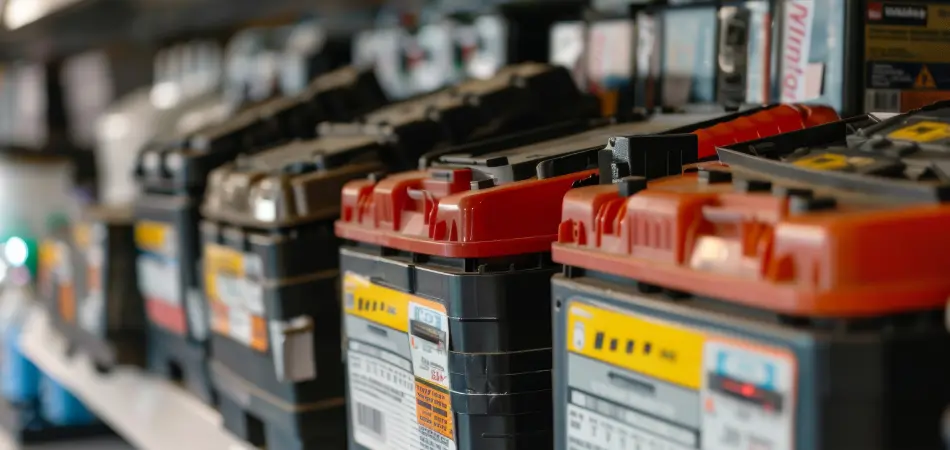Choosing the Best Car Battery: 8 Simple Steps

Selecting the right car battery is like navigating a dark maze of technical jargon and specs.
Follow this guide like the golden thread of Theseus, and you’ll never be lost or discouraged. You’ll emerge from the battery maze unscathed.
Of course, if you live close to Santa Ana, CA, your best option is to stop by our store and talk to one of our battery experts.
1. Battery Group Size
The group size of a battery refers to its physical dimensions, terminal placement, and type. Knowing your car’s recommended group size is crucial because an incorrect size can lead to installation issues or performance problems.
How to Find Your Group Size
- Check your vehicle’s owner’s manual for the recommended battery group size.
- Many auto parts stores and battery retailers offer guides where you can input your car’s make and model to find the correct battery size.
2. Cold Cranking Amps (CCA)
Cold Cranking Amps (CCA) measure your battery’s ability to start your car engine in cold temperatures. A higher CCA rating means better starting power in freezing conditions, which is critical if you live in a colder climate (like Southern California’s, ha-ha).
Determining the Right CCA
- Follow the CCA rating specified by your car manufacturer.
- If you experience harsh winters, opt for a battery with a higher CCA rating for reliable starts.
3. Reserve Capacity (RC)
Reserve capacity indicates how long a fully charged battery can operate essential accessories if the alternator fails. It’s measured in minutes and is critical to ensure your car runs smoothly in emergencies.
Why RC Matters
- A higher RC can keep your lights, radio, and other critical systems running longer if your car’s charging system fails.
- RC becomes particularly important on long trips where you might not have access to immediate service and must rely on your battery more heavily.
4. Battery Cell Type
Car batteries come in two cell configurations:
- Lead-Acid: Traditional, reliable, and less expensive.
- AGM (Absorbent Glass Mat): More advanced but at a higher cost.
Choosing the Right Cell Type
- Lead-acid batteries are suitable for most cars.
- AGM batteries offer better longevity and performance, particularly for performance vehicles like your Bugatti.
5. Battery Freshness
A battery’s performance degrades over time, even when not in use. Always check the manufacturing date indicated by a code on the battery.
How to Ensure Freshness
- Look for a code with a letter and number (e.g., A1 for January 2021).
- Purchase a battery that is less than six months old for optimal performance.
6. Brand & Warranty
Choosing a reputable brand ensures your battery meets high standards of quality and reliability.
Evaluating Warranties
- Look for batteries with more extended warranties, indicating confidence in their durability.
- Understand the terms — full replacement warranties offer better coverage than prorated ones.
7. Battery Terminals
Battery terminals must match your car’s configuration. There are top-post and side-post terminals, each suitable for different vehicle types.
Ensuring Compatibility
- Match the terminal type and orientation with your current battery.
- Avoid adaptors. Use a battery that fits your car’s original terminal setup.
8. Always Buy from a Reputable Supplier
Purchasing from a trusted supplier ensures you receive a high-quality battery with proper warranty support.
Tips for Choosing Suppliers
- Check customer reviews and ratings.
- For reliability, buy from authorized dealers (like Powertron) or well-known auto parts stores.
FAQs: Choosing a Car Battery
Q: Can I use a higher CCA battery than the one recommended by my car manufacturer?
It’s generally safe to go slightly higher, but going too high can damage your car’s electrical system.
Q: How long does a car battery typically last?
With proper maintenance and use, most batteries last 3–5 years. However, extreme temperatures and driving habits can affect longevity.
Q: Is it okay to buy used car batteries?
We don’t recommend buying used car batteries. Their performance and lifespan are unpredictable.
Q: What are the signs that my car battery is failing?
Common signs include a slow engine crank, dimming headlights, and the battery warning light on your dashboard. If you notice these symptoms, consider having your battery tested.
Q: Does weather affect car battery performance?
Yes, extreme temperatures (both hot and cold) can significantly impact a battery’s performance and lifespan. Cold weather can reduce the battery’s efficiency, while hot weather can evaporate the fluid, leading to internal damage.
Q: Can I replace my car battery myself, or should I have it professionally installed?
While many people can replace their car batteries with the right tools and guidance, a professional installation ensures proper and safe setup and disposal of the old battery.
Q: How can I prolong the life of my car battery?
Cleaning the terminals, checking the electrolyte level, and ensuring your battery is securely mounted can help prolong its life. Avoid frequent short trips and keep your vehicle in a garage during extreme temperatures.
Q: Are there any maintenance-free car batteries?
Many modern batteries are maintenance-free, meaning they’re sealed units that don’t require topping up with water. However, they should still be tested periodically.
More Articles

0 Comments